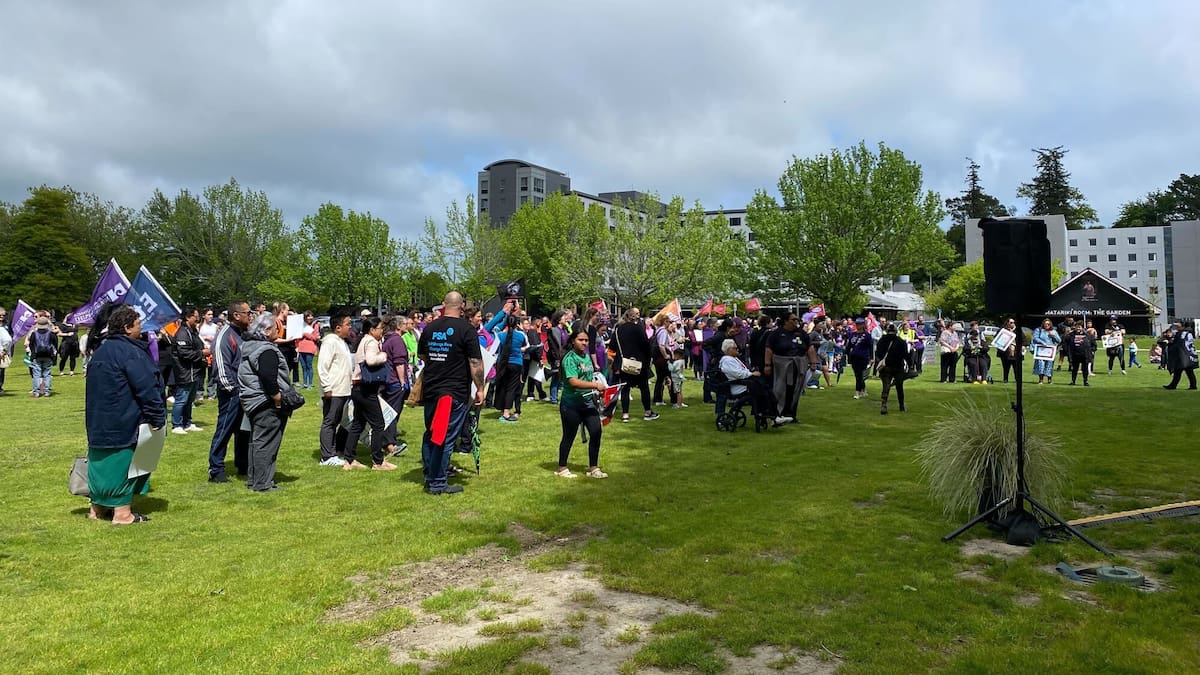“And they’ve given them no proper response to the resource issues – the short staffing, the breaking down of equipment and so on.”
Public Service Minister Judith Collins has released an open letter to people impacted by the strikes and said the actions appeared to be “politically motivated by the unions”.
While extreme weather in other parts of the country has disrupted strike plans, Rotorua has an overcast day.
People gather in Rotorua’s Village Green for the nationwide mega strike. Photo / Megan Wilson
Westbrook School principal Colin Watkins told the Rotorua Daily Post he had been in teaching since the 1970s.
“I’ve seen in almost every election, education and health have been used as a political football,” Watkins said.
“The situation for education and health in New Zealand is dire – it’s the worst I’ve ever known it.“
Watkins said a bipartisan approach was needed to solve problems in the sectors.
He said mainstream schools had “growing numbers” of neurodiverse students and “zero” resources to support them.
Hundreds of Rotorua strikers have gathered along Tutanekai St holding signs and flags, as cars driving by toot their horns in support. Photo / Megan Wilson
“All we’re really asking for is additional support in terms of support staff to help us.
“It would make a teacher’s job so much easier, and those children’s needs would be met far more than they are now.“
Prime Minister Christopher Luxon has called the planned action “a shame” and said he believed people were getting sick of unions “prioritising politics” over patients and pupils.
The strike event at Rotorua’s Village Green runs from 11am to 1pm, with speeches and sign-waving.
Westbrook School teachers strike outside their Malfroy Rd school.
Striking members of these unions are participating in the Rotorua event:
Public Service Association Te Pūkenga Here Tikanga MahiNew Zealand Nurses Organisation Tōpūtanga Tapuhi Kaikiaki o AotearoaNew Zealand Education Institute Te Riu RoaPost Primary Teachers Association Te Wehengarua.
Wagstaff said the Government knew that “cutting wages and by basically having people overworked and underpaid” risked the workforce dissipating and leaving for “better” places such as Australia.
He said it was unfair and “quite infuriating” for workers, given that the Government has said it would address the cost-of-living crisis.
“And here they are telling their own workers – their essential workers who keep everything running – that they should expect a pay cut.”
Wagstaff called on ordinary members of the public to strike with workers to show their support.
He said they were fighting not just for themselves, but for all Kiwis.
Collins has written an open letter to patients, students and families affected by the strike.
“The Government regrets the impact on you, your children and your families that is expected on Thursday because of a strike planned by a number of unions.
“We regret even more that the strike appears to be politically motivated by the unions. What else could possibly explain that in early October, when we were trying to negotiate with the secondary teachers’ union, the number one item on their agenda for a meeting with Education Minister Erica Stanford was Palestine,” Collins wrote.
“Palestine. Not terms and conditions. Not student achievement. Not the new curriculum. Palestine. That’s not what students or parents should expect.”
She said the Government had acted in good faith and met with unions’ demands for pay increases in line with inflation.
It valued “all public sector employees” but had a responsibility to manage the country’s finances carefully, especially when “money is tight”, she said.
“It is only unions who want strikes. We ask, once again, for them to come to the table. That is the place to talk and to bargain.”

